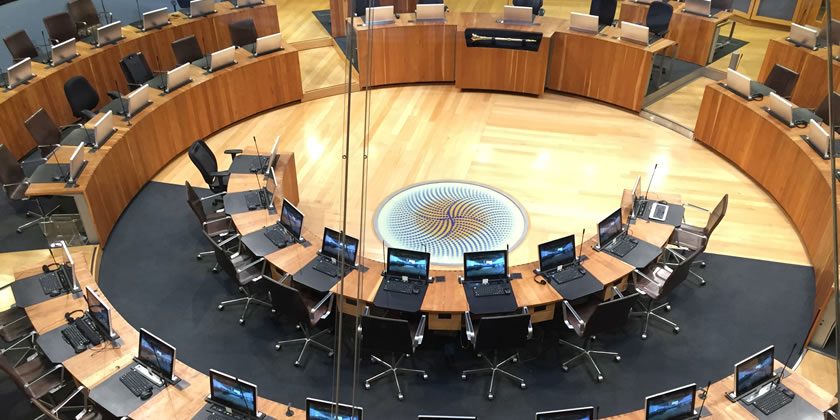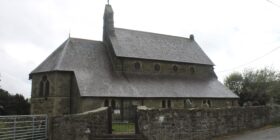First Minister cautions on devolution’s fragility at Senedd’s 25th anniversary

The first minister warned that devolution remains fragile as Senedd members reflected on the 25th anniversary of the first election to the then-National Assembly.
Vaughan Gething described the findings of an independent commission on Wales’ constitutional future as a “wake-up call of the fragility of devolution as we know it”.
Mr Gething said the report highlights the opportunity costs of doing nothing to actively improve democracy and civil engagement in Wales.
He told the chamber, also known as the Siambr: “We have real challenges before us, and we cannot ever be complacent about our ability to achieve more for Wales.
“A better future for Wales needs us to take action and continue the devolution journey.”
The first minister highlighted “successes” of devolution so far, including carrier bag charges, free prescriptions, Wales’ opt-out system for organ donation and a new curriculum.
‘Modern Wales’
Andrew RT Davies criticised those on the right of Welsh politics – including some in his own party – who argue the Senedd should be abolished.
“I don’t agree with that,” said the Tory group leader. “And I will argue every time with anyone who says that Wales should put its parliament to one side and go back to a 1950s, 1960s model of government. That’s not the modern Wales we want to see.”
Mr Davies disagreed that devolution sets a trajectory towards inevitable independence as he called for a relentless focus on utilising current powers to improve people’s lives.
Raising concerns about low turnout, he said the legitimacy of the Welsh Parliament will grow if a greater proportion of people vote in Senedd elections.
He said: “There is a lot of work to do and the big job of work is to get the people of Wales engaged as to what we can do as a parliament and what you can do as a government.”
‘Missed opportunities’
Rhun ap Iorwerth called for more innovation in the delivery of public services in Wales, with devolution providing a buffer against the headwinds of Westminster and beyond.
The Plaid Cymru leader highlighted that Wales Governance Centre data shows a majority of people want more devolution, with support for independence almost tripling since 1999.
He urged the Welsh Government to carve a distinct path for constitutional change in Wales.
Mr Iorwerth lamented missed opportunities to make strides towards tackling challenges around the economy, health, education and child poverty.
He said: “Let us ensure the next 25 years focus on proving the true value of devolution, by tackling those challenges … and strengthening our democracy.”
‘Community agitators’
Jane Dodds paid tribute to former Lib-Dem members Mick Bates and Aled Roberts, two “very loyal and committed public servants”, who died in recent years.
The Lib Dems’ leader in Wales pointed out that her predecessor, Kirsty Williams, guided backbench legislation on nurse staffing levels through the Senedd onto the statute book.
Ms Dodds, who represents Mid and West Wales, told the chamber her mother was part of a stakeholder group that helped in the development of the then-Assembly.
“She wasn’t a politician at all; she was a community agitator,” she said. “And that’s where, I think, we should be going back to: listening to those community agitators, making sure that we involve everybody across Wales….
“We have an awesome opportunity to continue to change Wales, to make it more radical, progressive, surprising and inspiring, but we do need to get back to listening.”
‘Outward-looking’
Vikki Howells, a Labour backbencher who represents Cynon Valley, said it should be a matter of pride that the Senedd has not only endured but matured.
She said: “It’s not always been an easy journey, but we all owe a debt of gratitude to those who came before us and worked hard to establish a confident, outward-looking parliament.”
Luke Fletcher, who was three at the time of the 1999 election, pointed out that a generation has grown up with the Senedd.
The Plaid Cymru MS for South Wales West stressed that delivering improvements to people’s lives must be the focus of the next 25 years.
John Griffiths, who is one of the four sitting members first elected in 1999, called for new constitutional arrangements to recognise the reality of a devolved UK.
‘Failure’
Adam Price, the former Plaid Cymru leader, raised concerns about low turnout, with less than half of the electorate voting in the six Senedd elections since 1999.
He said “I think the failure to achieve more than 50% turnout in any of the elections since the creation of the institution is a problem that we have to solve, isn’t it?
“Because the longer that continues, the more it will erode the legitimacy but also the effectiveness of this institution.”
Mr Price, a former MP, who represents Carmarthen East and Dinefwr, urged Wales to introduce mandatory voting for the 2030 election.
Mr Gething said he personally supports compulsory voting but the Welsh Government does not yet have a fixed position, suggesting it is not among his administration’s priorities.
‘Incredible’
Heledd Fychan, the Plaid Cymru MS for South Wales Central, highlighted that Wales was the first UK nation to introduce free access to museums.
She said: “It was a huge success; within a year, we saw an increase of 88% in those accessing our national collections, going from 764,599 to 1.4 million, which is incredible.”
Samuel Kurtz, the Conservative MS for Carmarthen West and South Pembrokeshire, who was seven in 1999, urged the public to have their say at the ballot box.
Closing the statement on May 7, Elin Jones, who is the speaker or Llywydd, stressed that it is the people’s Senedd, not a politicians’ parliament.
She said: “We were elected to look forward, and to plan for the future, and that’s what we’re doing here, for the next 25 years, and, indeed, the next century.”
By Chris Haines, ICNN Senedd reporter
Spotted something? Got a story? Send a Facebook Message | A direct message on Twitter | Email: [email protected]Latest News









